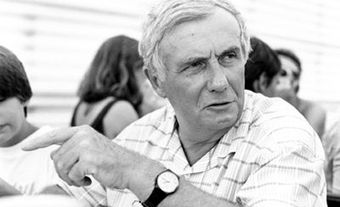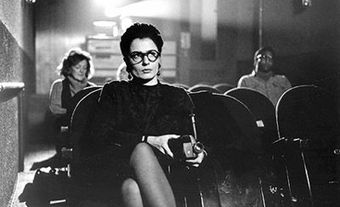Evelyn Lambart
Evelyn Lambart, animator (b at Ottawa 23 Jul 1914; d 3 Apr 1999). Eve Lambart studied at the Ontario College of Art, graduating in 1937. In 1942, she became the first woman animator to join the NATIONAL FILM BOARD OF CANADA (NFB) and began by specializing in graphics and maps, which were used extensively in The World in Action series. Known as the "First Lady of Canadian animation," nevertheless she toiled in relative obscurity for more than 25 years, her work overshadowed by the reputation of her partner on many films, Norman MCLAREN.
Lambart made significant contributions to McLaren's famous collaboration with Oscar PETERSON, Begone Dull Care (1949; best documentary/cultural film at the Berlin Film Festival), the experimental 3D films Around Is Around (1951) and Now Is the Time (1951), commissioned by the British Film Institute for the Festival of Britain, and the pixilated A Chairy Tale (1957), where she made a chair come to life to the comic frustration of Claude JUTRA, earning herself an Oscar nomination.
Toward the end of her stay at the NFB, Eve Lambart developed her uniquely individual technique, using paper cutouts and bright colours depicting characters in morality tales for children. The most famous of these are Mr. Frog Went a-Courting (1974), The Lion and the Mouse (1976) and The Town Mouse and the Country Mouse (1980). Lambart left the NFB in 1974 but continued to work on films from her studio at home in the Eastern Townships. Eve Lambart, a film about Lambart's life in semi-retirement, was directed by Margaret Wescott in 1978.
Lambart's other notable films include Maps in Action (1945); Family Tree (1950; with George Dunning, Canadian Film Award); Challenge: Science against Cancer (1950; with Colin LOW); The Fight: Science against Cancer (1951; with Low, Oscar nominee for short documentary and special award from the Canadian Film Awards); The Colour of Life (1955; with Robert Verrall, Canadian Film Award); and Lines: Horizontal (1960; Canadian Film Award), Lines: Vertical (1960) and Mosiac (1965) with Norman McLaren.

 Share on Facebook
Share on Facebook Share on X
Share on X Share by Email
Share by Email Share on Google Classroom
Share on Google Classroom


